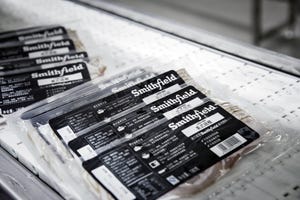February 21, 2014

Having barn personnel present when sows are farrowing and ensuring proper colostrum intake for piglets soon after birth can lead to significant benefits when it comes to building immunity in the piglets and helping equip them to respond to health challenges, according to Beth Ferry, Michigan State University Extension swine specialist.
She cites a 2013 research trial done by Khanh Nguyen, University of Guelph (Ontario, Canada), conducted to determine if induced farrowings resulted in increased colostrum intake for piglets, thus ensuring an improved immunity response.
The trial was conducted on a 600-sow farrow-to-feeder pig operation. Sows in the trial were split into two treatment groups. Group one was made up of 56 sows that were induced at 8 a.m. and 2 p.m. on day 114 of gestation. The second treatment group was made up of 84 sows that were allowed to farrow naturally.
Like what you’re reading? Subscribe to the National Hog Farmer Weekly Wrap Up newsletter and get the latest news delivered right to your inbox every week!
The first treatment group received enhanced day one pig care, which included drying and warming of piglets as well as making sure that each piglet received colostrum. These practices are considered to be a benefit of attended farrowings.
The second treatment was a designated control group in which sows were observed twice daily at feeding time. Farrowing assistance was provided if needed at that time, and no additional care was given to piglets.
Immunity response was measured by blood samples taken from the piglets when they were three days of age in order to verify the serum concentration levels of immunoglobulin G (1gG). Test results revealed that levels of 1gG did indeed differ between the control and induced sow groupings. Researchers discovered that 59% of the piglets born to sows in the induced group had high levels of lgG, whereas 37% of the piglets from the control group of sows had high levels of lgG.
Ferry says it can be concluded that scheduled and attended farrowings benefit production numbers by allowing for improved colostrum intake by piglets, resulting in improved immunity as evidenced by 1gG levels. When caregivers are present to make sure piglets are able to nurse, the piglets are able to develop improved immunity.
This trial also indicated that birth order of piglets and sow parity had no effect on colostrum intake.
An additional research project conducted by Nguyen in 2011 involved 159 multi-parity sows while investigating the benefit of attended farrowings in terms of stillborn piglets.
You might also like these stories:The Ultimate Swine Leadership ChallengeCaring for PigsTop Ten Tips for Attended Farrowings
You May Also Like


